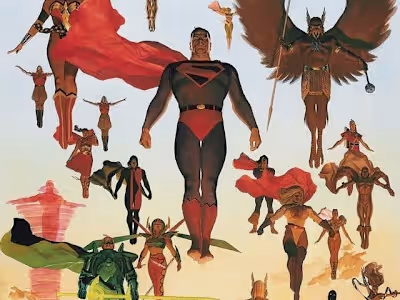What independent film can learn from Superman and Tolkien
INTRODUCTION
Filmmakers face a common challenge in their work like any other artist. Independent film especially has a daunting task ahead of it. The challenge, of course, is creating works of art that resonate with audiences. In the modern age, we have multiple devices competing for our attention. It limits the amount of time we have for even a single movie. As technology advances, the problem is likely to get worse. But please read the conclusion to learn of a solution from the past to our modern problem!
FILMMAKING
Independent film commonly has had challenges, going against the mainstream. And now, with the problems mentioned earlier, their obstacles are mightier than ever. But the solution to these issues is criminally simple, yet hard to execute. They must make better characters! Independent film needs characters that can stand the test of time!
Easier said than done, I know. But it's become apparent that the mainstream has forgotten the human element of character writing. It's a common belief that modern viewers will reject stories that don't adhere to their reality. So, to make their works relevant, they chase trends they believe will make them relatable.
In essence, this way of writing rejects the very notion of human empathy and compassion. It denies our ability to feel the pain of another. And shackles a project to a particular time. For example, films like 12 Angry Men are masterpieces of story, dialogue, and character development. But the movie is confined to a single room where the characters debate for hours on justice and morality!
However, we must learn from the best to understand what makes a character timeless. And in my humble opinion, there's no better teacher than Superman!
THE EMPATHY PROBLEM
Independent film commonly has had challenges, going against the mainstream. And now, with the problems mentioned earlier, their obstacles are mightier than ever. But the solution to these issues is criminally simple, yet hard to execute. They must make better characters! Independent film needs characters that can stand the test of time!
Easier said than done, I know. But it's become apparent that the mainstream has forgotten the human element of character writing. It's a common belief that modern viewers will reject stories that don't adhere to their reality. So, to make their works relevant, they chase trends they believe will make them relatable.
In essence, this way of writing rejects the very notion of human empathy and compassion. It denies our ability to feel the pain of another. And shackles a project to a particular time. For example, films like 12 Angry Men are masterpieces of story, dialogue, and character development. But the movie is confined to a single room where the characters debate for hours on justice and morality!
However, we must learn from the best to understand what makes a character timeless. And in my humble opinion, there's no better teacher than Superman!
THE TIMELESS OF SUPERMAN
It's because of this timelessness that Superman can connect to anyone regardless of a person's background. Many of these ideas were in his character from its inception and were only expounded upon by later writers. And even as vocal critics try to invalidate Clark as a character, what he represents has only grown in relevance.
Furthermore, the themes that Clark best represents are justice, hope, and kindness.
Justice is arguably the theme that most defines him. It was present as early as his first comic, where Clark saved a wrongly convicted person from death row by breaking into a government official's house in the dead of night. Later, writers would refine this theme using the character's godly strength as a thought exercise in the importance of morality.
Do morals matter when a person is immune to consequences? The answer that Clark presents is yes, they do. Because even when you believe that people are separate or different, their actions still have consequences for each other.
Hope is Clark's other most prominent theme and a dearly needed resource according to science. If our actions have consequences on others, then that means that one way or another, they are inherently meaningful.
So, Clark stands as a reminder of the dangers of despair.
However, some say Clark's strength makes him immune from all forms of hardship, so his message of hope is invalid! But this couldn't be further from the truth!
It stems from the final theme of kindness. Clark is still very much vulnerable to emotional and psychological conflicts. Conflicts that many in the modern day still refuse to recognize can be just as devastating as physical wounds!
Dr. Viktor Frankle knew that as life grew easier, it would exasperate our crisis of meaning. Clark is a fictional version of this phenomenon, showing how even the man who has everything still struggles with existential issues. For example, whenever his godly powers fail him, such as when his human father Johnathon dies of a heart attack.
In short, Clark is a reminder that the grass is always greener on the other side and that we discount others' struggles because we believe they have it easy.
ON FAIRY STORIES
But for a more practical method of how independent film can construct timeless characters, I turn to Dr. JRR Tolkien.
Tolkien said in his essay on fairy stories that a writer "Makes a Secondary World which your mind can enter. Inside it, what he relates is true: it accords with the laws of that world!"
He meant that an author should endeavor to make their work realistic. Not that a fictional work should adhere to our reality. However, the creator should thoroughly explore and follow the rules and implications of the setting. No matter how outlandish and fantastic they are.
For example, using 12 Angry Men again, the film spares no expense, exploring the characters' emotions and psychology. But it wouldn't work if, at any moment, the creators made them do something that didn't fit the seriousness of the subject matter.
CONCLUSION
Independent films shouldn't be afraid to challenge audiences with stories far beyond their reality. And this remains true even for the most outlandish narratives imaginable, fairy stories. Siting Dr. Tolkien again, he said they're"to clean our windows; so that the things seen clearly may be freed from the drab blur of triteness or familiarity—from possessiveness."
In short, fantasy helps us recover clear vision and see the truth. So we can face the challenges of the world again.
Furthermore, Superman shows how such fairy stories work. They contain the timeless elements that give fiction longevity and transfer universal truth.
But ultimately, they can only do their work when the creator commits fully to the fictional setting's rules. And has faith in the audience's ability to connect with the deeper themes!
Like this project
Posted Apr 8, 2024
In my article, I dissect two titans of storytelling from the past to see what current works and artists can learn. And what makes a fiction truly timeless!
Likes
0
Views
6







